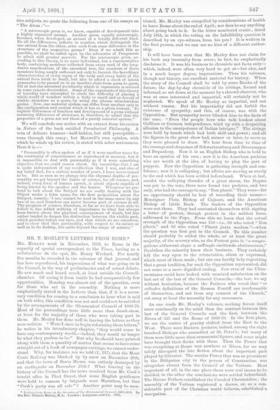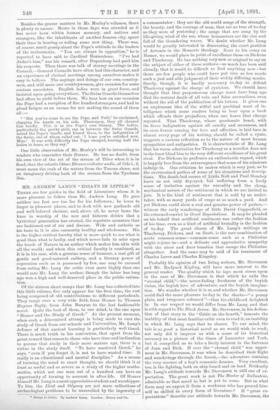MR. T. MOZLEY'S LETTERS FROM ROME.*
Mn. MezeiNv went in November, 1869, to Rome in the capacity of special correspondent to the Times, having as a collaborateur on the spot, Mr. Henry Wreford. For nearly five months he recorded in the columns of that journal, and has here reproduced, his impressions of what was going on in the Council, in the way of preliminaries and of actual debate. He saw much and heard much, at least outside the Council- chamber. Of seeing it from inside he had comparatively few opportunities. Hearing was almost out of the question, even for those who sat in the assembly. Nothing is more emphatically stated in the Letters than that, if it is a neces- sary condition for coming to a conclusion to bear what is said on both sides, this condition was not and could not be satisfied by the arrangements of the (Ecumenical Council of 1869-70. Most of the proceedings were little more than dumb-show, at least for the majority of those who were taking part in them. Mr. Mozley has done well in leaving the letters as they were written. " Were I once to begin reforming these letters," he writes in his introductory chapter, " they would cease to have any contemporary worth,—indeed, they would no longer be what they profess to be." But why he should have printed along with them a quantity of matter that seems to have come straight out of a book of newspaper-cuttings, we cannot under- stand. Why, for instance, are we told (I., 217), that the Mont Cenis Railway was blocked up by snow on December 29th, and that the town of Santa Maura was entirely destroyed by an earthquake on December 28th P What bearing on the history of the Council has the news received from Mr. Cook's tourist office in Fleet Street, that some English gentlemen were held to ransom by brigands near Marathon, but that " Cook's party was all safe " P Another point may be men- * * Lattors from Rotes on the Occasion of tho (Boman:foal Council, 1869-1870. By the Bey. Thonoue Alonley, ICA, London Loagmaiis and Co. 1891.
tioned. Mr. Mozley was compelled by considerations of health to leave Rome about the end of April; nor does he say anything
about going back to it. Is the letter numbered ccxxiv., dated July 19th, in which the voting on the Infallibility question is described by an eye-witness, from his pen P It is written in the first person, and we can see no hint of a different author- ship.
It will have been seen that Mr. Mozley does not claim for his book any immunity from error ; in fact, he emphatically disclaims it. It was his business to chronicle not facts only— which, indeed, were often very hard to get at—but also, and in a much larger degree, impressions. Thus his volumes, though not history, are excellent material for history. When the story of the Council shall be told by some Ranke of the future, the day-by-day chronicle of its sittings, formal and informal, as set down at the moment by a shrewd observer, who was at once interested and impartial, will certainly not be neglected. We speak of Mr. Mozley as impartial, and not without reason. But his impartiality did not forbid the existence of sympathy, and this, of course, was with the Opposition. But sympathy never blinded him to the facts of the ease. "Even the people here who talk loudest about Galilean or German independence, wind up with a despairing allusion to the omnipotence of Italian intrigue." The strings were held by hands which had both skill and power ; and all the figures in the great show had, sooner or later, to move as they were pleased to draw. We hear from time to time of the courage and eloquence of Schwa rtzenburg and Strossma,yer and Dupanloup. Now it is an English Bishop who is bold to have an opinion of his own ; now it is the American prelates• who are wroth at the idea of having to play the part of puppets. Now the Opposition is gathering strength and con-. fidence; now it is collapsing ; but affairs are moving as surely to the end which has been settled beforehand. When at last,. amidst the volleying thunder of a great storm, the Dogma was put to the vote, there were found two prelates, and two only, who had the courage to say, "Non placet." They were—for no opportunity should be lost of recording their names— Monsignor Pioio, Bishop of Cajazzo, and the American, Bishop of Little Rock, The leaders of the Opposition were not there. They had contented themselves with signing a letter of protest, though protest in the mildest form, addressed to the Pope. From this we learn that the actual, strength of the Opposition was 150 —i.e., 88 who voted Non, plaoet," and 62 who voted " Placet juxta modum "—when the question was first put to the Council. To this number should probably be added the whole, or at least the great. majority, of the seventy who, as the Protest puts it, " a emigre- gatione abfuerunt atque a suffragio emittendo abstinuerunt." Doubtless the minority knew their business. They certainly- left the way open to the retractation, silent or expressed, which most of them made; but one can hardly help regretting that a great tradition, for such the Opposition represented, did. not come to a more dignified ending. Few even of the Ultra- montanes could have looked with unmixed satisfaction on the last act of the last of the General Councils,—the last, we say without hesitation, because the Fathers who voted that " ex cathedra definitions of the Roman Pontiff are irreformable• of themselves, and not from any consent of the Church," cut away at least the necessity for any successors.
As one reads Mr. Mozley's volumes, nothing forces itself more continually on the mind than the contrast between this last of the General Councils and the first, between the Nictea of 325 and the Rome of 1869-70. In the first place, we see the centre of gravity shifted from the East to the West. There were Eastern prelates, indeed, among the eight hundred Bishops who assembled at St. Peter's ; but many of them were little more than ornamental figures, and some might have brought their flocks with them. Then the Power that was everything at Rome was nowhere at Niel:ea, for we may safely disregard the late fiction about the important part. played by Silvester. The secular Power that was so prominent in the Bithynian city in the person of Constantine, was altogether absent from the Council of the Vatican. Most important of all, in the one place there were real issues to be decided, in the other the conclusions were settled beforehand. The Nicene Fathers established the Creed of Christendom ; the assembly of the Vatican registered a decree, or, as a con- siderable part of the Christian world believes, established a. usurpation.
Besides the graver matters in Mr. Mozley's volumes, there is plenty to amuse. Rome in those days was crowded as it has never been within human memory, and natives and strangers, like the inhabitants of another famous city, spent their time in hearing or telling some new thing. There was, of course, much gossip about the Pope's attitude to the leaders of the malcontents. "You are always in opposition," he is reported to have said to Cardinal Bonnechose. "I've had Judas's kiss," was his remark, after Dupanloup had paid him his respects. Then there was talk of stormy meetings in the Council,—General Councils have often had this character, and an experience of clerical meetings among ourselves makes it easy to believe. The sayings and doings of our own country- men, and still more our countrywomen, give occasion for some curious anecdotes. English ladies were in great force, and insisted upon going everywhere. The Swiss Guards themselves
had often to yield before them. We hear how on one occasion the Pope had a reception of five hundred strangers, and had to plead fatigue as an excuse for not making the round of them all :-
"' But you've come to see the Pope, and Voila,' ho exclaimed, clapping his hands on his side. Thereupon, they all cheered him loudly. This is in the Pope's own library. The ladies, particularly the pretty girls, ran in between the Swiss Guards, seized the Pope's hands, and kissed them, to the indignation of the Swiss, one of whom called out, hope you're satisfied now, Miss.' It was with difficulty the Pope escaped, leaving half the ladies in tears, so they say."
One little observation of Mr. Mozley's will be interesting to readers who remember their Horace. He has no doubt, from his own view of the set of the stream of Tiber when it is in flood, that the retortis 'Wore Etrusco violenter undis, of Ode i., 2, must mean the rush of the waters from the Tuscan shore, not an imaginary driving back of the stream from the Tyrrhene Sea.



































 Previous page
Previous page